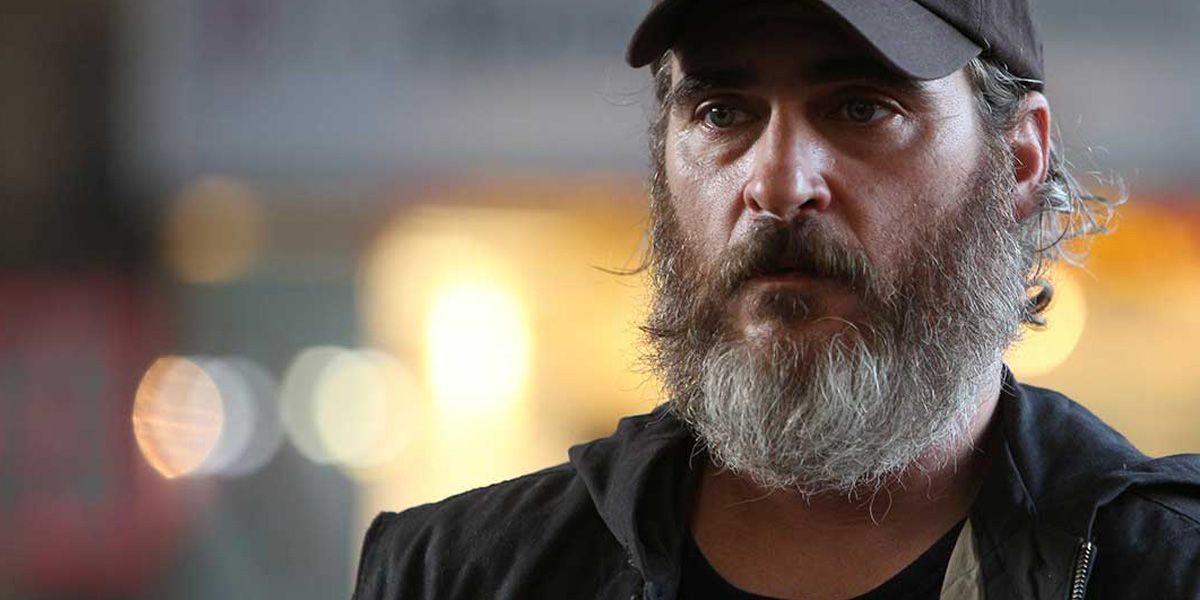Lynne Ramsay’s fourth feature, a violent thriller, is as simple as it is discreet.

Critics are comparing You Were Never Really Here to Martin Scorsese’s Taxi Driver and I’m here to say that as far as comparisons go, this is one is pretty tenuous and much too basic. While it’s true both films are about stoic traumatised men who, at some point, go on a violent mission to save a teenager from a child-prostitution ring, that’s where the similarity ends.
Lynne Ramsay’s style is more reminiscent of the discreet but unforgivingly brutal violence of Takashi Kitano. Stripped down to the bare necessities of the story, it needs no distracting subplots or other embellishments – it’s 89 minutes that grab you by the collar and won’t let go until the end.
Joaquin Phoenix, at his most subdued, plays Joe, the contracted killer with a knack of doing the job without getting caught. When he’s not killing, Joe divides his time between caring for his sick elderly mother and contemplating suicide, but when he takes the seemingly simple job of saving the teenage daughter of a politician, he’s lead down a path of no return, one that forces him to face his own traumatic demons and the reasons to still be alive.
Occasional flashbacks to Joe’s childhood paint a thorough psychological portrait; a man so defined by his own traumatic experience that he lets his past dictate every aspect of his present. Lynne enjoys deconstructing Joe, throwing him down the road of enlightenment, yet she sees nothing heroic about him, just sadness and anguish. Joe is the kind of character a male director would find difficult not to glamorise, he is the antihero at the centre of a bloody mission to rescue a defenceless damsel in distress, but Lynne’s treatment of Joe makes her viewers question the value of the film’s protagonist.
Lynne shoots every scene of violence differently, but never in a graceful way. Sometimes it’s confusing, sometimes ugly and raw. One particular scene is shot through the point of view of CCTV cameras that hide most of the action, and another that happens off screen while we’re still in the previous scene.
They don’t have a hint of catharsis in them, which makes them even more difficult to grasp. We’re so accustomed to experiencing violence like an energising pump, it’s disconcerting to think of it as something only a certain type of traumatised sociopath could deal with.
After Morvern Callar and We Need To Talk About Kevin, it’s still impossible to predict what Ramsay’s next step is. There’s a methodology to her visual style, but she always takes on a different genre like a blank slate, transforming herself into what each film needs her to be.
While Morvern Callar was saturated and hip, Kevin was clean but psychologically intense, YWNRH is primal and grainy. Each one of these styles would be the signature of a different director, but Ramsay takes on the challenge to adapt herself to the subject. And so far she’s nailing all of them.
You Were Never Really Here ties up the end with a delicious wink.
In fact, I admit I wasn’t sure about the film until its last scene. But it’s an ending that works because it forces its protagonist to face his absurdity, and without spoiling it, there is something particularly amusing about the way it comes to pass.
And then, like the rest of the film, it just ends. No epilogue, no follow-up. Just kicks us out so we can go on with our lives.
This kind of brevity is enviable.
The Best
Nothing is wasted here. From Jonny Greenwood’s intense soundtrack, to a script completely focused in its goal. Even Joaquin Phoenix’s quiet glumness only adds weight to his Joe.
The Rest
This is all Lynne Ramsay! A savage breakdown of the male hero stereotype. It doesn’t get distracted by a plot that could’ve taken a much more mundane route. Not that I would expect any less from her.
FIB Rating: ★ ★ ★ ★







